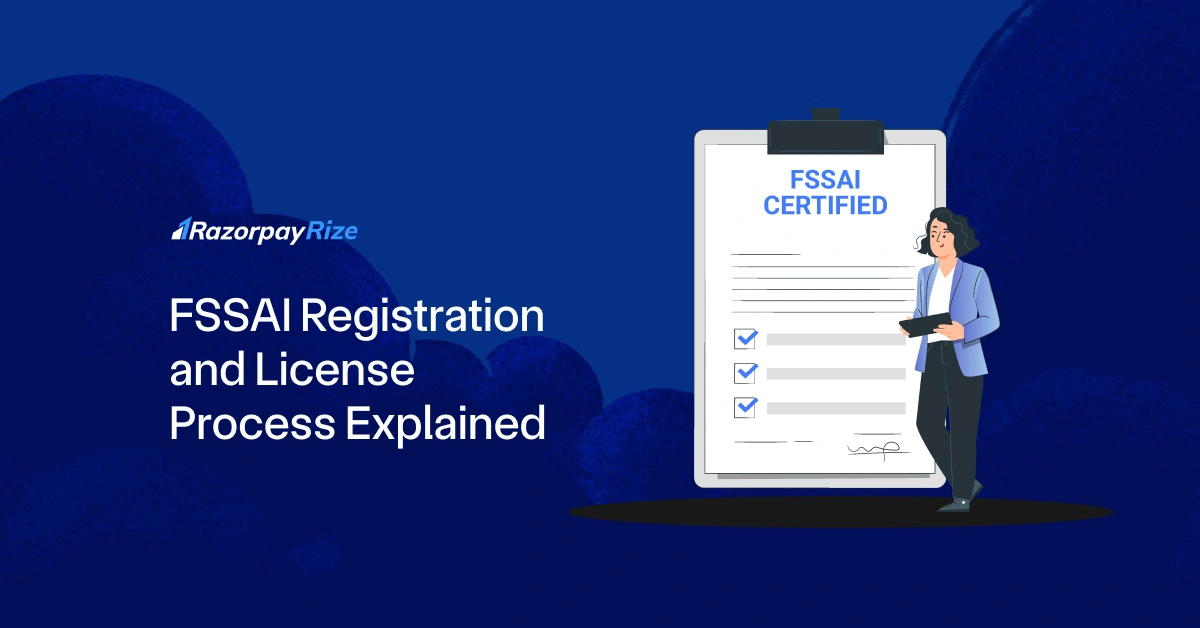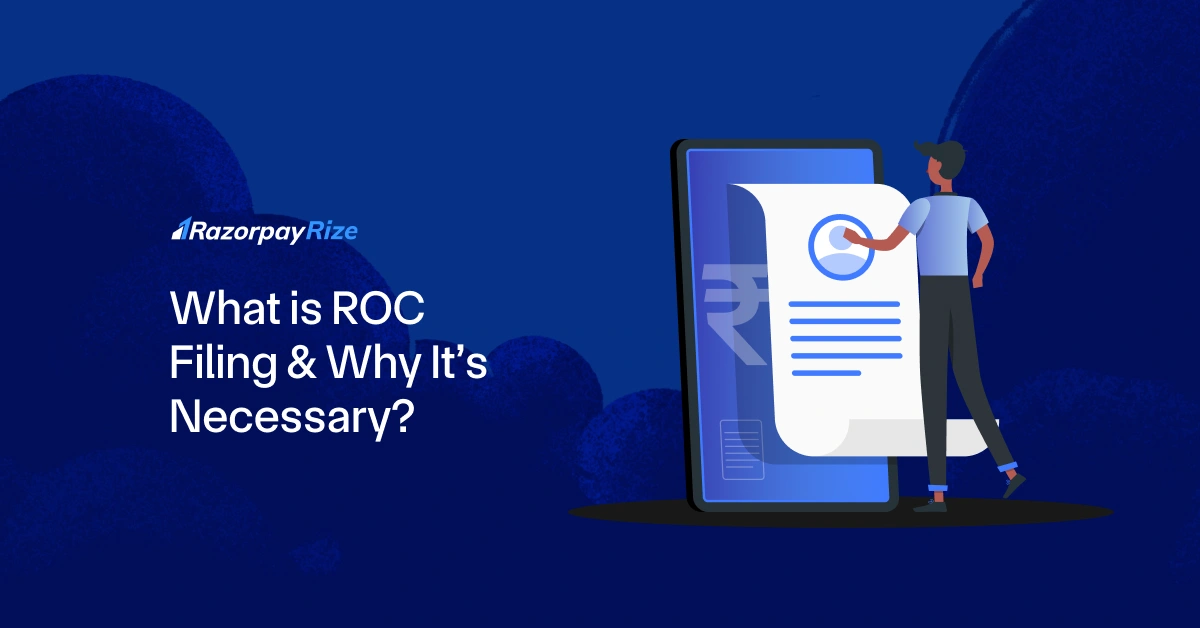If you’re running a food business in India, chances are you’ve heard about FSSAI. But what exactly is it, and why is it so important? FSSAI stands for the Food Safety and Standards Authority of India- the apex regulatory body responsible for ensuring food safety and hygiene standards across the country.
For any food-related business operating in India, obtaining an FSSAI registration or license is mandatory. This ensures that the business complies with the Food Safety and Standards Act, 2006, enhancing consumer trust and legal credibility.
In this blog, we’ll walk you through everything you need to know about FSSAI, from types of licenses and who needs them, to how to apply, what documents you need, and even penalties if you don’t comply.
Table of Contents
FSSAI Registration
FSSAI Registration is the basic license issued to small-scale food businesses by the state food safety authorities. It applies primarily to small food business operators (FBOs) whose turnover falls below a certain threshold and who operate within a single state.
This registration is essential to legally operate a food business and ensures compliance with food safety norms. However, for larger businesses or those operating across multiple states, an upgraded license (State or Central License) is required.
Food Business Operators Who Need FSSAI Registration?
The following food businesses typically require FSSAI Registration:
- Small Manufacturers: Small-scale producers of food items with limited turnover.
- Transporters: Entities involved in the transportation of food within the state.
Retailers: Small shops, grocery stores, or vendors selling food products directly to consumers. - Small Food Businesses: Street food vendors, hawkers, or home-based food businesses.
- Medium Food Businesses: Hotels, Restaurants & Bars
Types of FSSAI Registration
Beyond legal compliance, filing ITR offers several advantages:
Benefits of Obtaining an FSSAI Food License
Obtaining an FSSAI license offers multiple advantages:
- Consumer Trust: Shows commitment to food safety, increasing customer confidence.
- Legal Compliance: Avoids penalties and legal issues by following regulations.
- Business Expansion: Facilitates scaling operations across states and international markets.
- Brand Credibility: Enhances brand image by adhering to recognised safety standards.
- Access to New Markets: Many retailers and e-commerce platforms require FSSAI certification.
{{company-reg-cta}}
FSSAI Registration Eligibility
Below is the eligibility criteria for FSSAI registration:
- Annual turnover up to ₹12 lakhs.
- Operates only within a single state.
- Includes small-scale manufacturers, traders, retailers, hawkers, and temporary stall owners.
FSSAI License Eligibility
Businesses requiring State or Central Licenses typically fulfil these conditions:
- Annual turnover between ₹12 lakhs and ₹20 Crores (State License).
- Annual turnover exceeding ₹20 crores (Central License).
- Operations across multiple states or involved in import/export.
- Large-scale food processors and manufacturers.
Food Capacity Limit Required for Obtaining FSSAI Registration
Note: These limits may vary based on specific food categories and local regulations.
Documents Required for Obtaining the FSSAI Registration/License
Common documents needed include:
- Identity Proof (Aadhar, PAN Card)
- Address Proof of Business Premises (Rent Agreement/Utility Bill)
- Passport-sized Photographs of the Applicant
- Certificate of Incorporation (for companies)
- Food Safety Management Plan or Statement of Food Products
- NOC from the local municipality or health department
- Proof of possession of premises (ownership or lease)
How to Apply for FSSAI Registration Online?
Applying for an FSSAI Registration or License online is a straightforward process — and the best part is, you can do it all from the comfort of your home or office.
Step 1: Visit the Official FSSAI Website
Head over to the official Food Safety Compliance System (FoSCoS) portal: https://foodlicensing.fssai.gov.in
Step 2: Create an Account
Click on “Sign Up” and fill in your details like name, mobile number, email ID, and state of operation. Once registered, you’ll receive login credentials via email or phone.
Step 3: Fill in the Application Form
After logging in, choose the appropriate license type based on your business size and turnover (Basic, State, or Central). Then, fill in the required details such as:
- Business name and address
- Type of food business (manufacturer, distributor, caterer, etc.)
- Contact information
- Business turnover and food handling capacity
Step 4: Upload Required Documents
Upload scanned copies of all the necessary documents.
Step 5: Pay the Application Fee
Once the form is complete and documents are uploaded, proceed to pay the applicable fee online. The amount depends on the license type and duration selected (1–5 years).
Step 6: Submit the Application
Double-check all details before clicking “Submit”. Once submitted, you’ll receive an application reference number which you can use to track your status.
Step 7: Track Your Application Status
Use the “Track Application” feature on the dashboard to monitor progress. You’ll receive notifications if additional info or documents are required.
Once submitted, your application will be reviewed by the local food safety officer. They may conduct a physical inspection (for licenses) or approve the application directly (for Basic Registrations). Upon approval, you’ll receive your FSSAI certificate online.
FSSAI License Cost & Validity
Costs may vary based on license duration and type.
FSSAI Registration Status
How to Check Status:
- Visit the FSSAI portal.
- Log in using registered credentials.
- Navigate to the “Application Status” section.
- Enter your Application/Registration number.
- View the current status (Pending, Approved, Rejected).
FSSAI Penalty and Offences
The Food Safety and Standards Authority of India (FSSAI) takes food safety very seriously — and rightly so. Non-compliance can lead to hefty penalties, legal action, or even imprisonment, depending on the nature and severity of the offense.
Here’s a breakdown of common offences under the Food Safety and Standards Act, 2006, and their corresponding penalties:
Renewal of FSSAI License
Renew your license at least 30 days before it expires. The process is similar to applying for a fresh — just log in, fill out renewal forms, upload updated documents, and pay the fees. Missing renewal deadlines can lead to fines or even suspension of your license.
FSSAI License for Cloud Kitchen
Cloud kitchens, operating without a physical dine-in space, are also required to obtain FSSAI licenses. Typically, they fall under:
- Basic Registration: If turnover and scale are small.
State License: For larger cloud kitchens with higher turnover.
The application process is the same, focusing on food safety management specific to cloud kitchens.
Conclusion
FSSAI registration and licensing are essential for any food business in India. They help keep your customers safe, build your brand, and keep you on the right side of the law.
So, if you're running any kind of food business, be it a small catering outfit, a packaged snack brand, or an export-oriented manufacturing unit, FSSAI must be part of your growth strategy. It’s a small step toward compliance, ensuring that you’re meeting the highest standards of food safety and hygiene.
Frequently Asked Questions
Private Limited Company
(Pvt. Ltd.)
- Service-based businesses
- Businesses looking to issue shares
- Businesses seeking investment through equity-based funding
Limited Liability Partnership
(LLP)
- Professional services
- Firms seeking any capital contribution from Partners
- Firms sharing resources with limited liability
One Person Company
(OPC)
- Freelancers, Small-scale businesses
- Businesses looking for minimal compliance
- Businesses looking for single-ownership
Private Limited Company
(Pvt. Ltd.)
- Service-based businesses
- Businesses looking to issue shares
- Businesses seeking investment through equity-based funding
One Person Company
(OPC)
- Freelancers, Small-scale businesses
- Businesses looking for minimal compliance
- Businesses looking for single-ownership
Private Limited Company
(Pvt. Ltd.)
- Service-based businesses
- Businesses looking to issue shares
- Businesses seeking investment through equity-based funding
Limited Liability Partnership
(LLP)
- Professional services
- Firms seeking any capital contribution from Partners
- Firms sharing resources with limited liability
Frequently Asked Questions
What is the difference between an FSSAI license and registration?
Proprietorship compliance refers to the set of legal, financial, and tax-related requirements that a sole proprietorship must fulfil. This includes:
- FSSAI Registration is for small food businesses with an annual turnover of up to ₹12 lakh. It’s a basic registration issued by the State Authority.
- An FSSAI License is required for larger businesses and is categorised into:
- State License (₹12 lakh–₹20 crore turnover, within one state)
- Central License (above ₹20 crore turnover or interstate operations)
- State License (₹12 lakh–₹20 crore turnover, within one state)
Is GST compulsory for an FSSAI license?
No, GST is not mandatory to obtain an FSSAI license or registration. However, for certain food businesses, especially those that sell online or supply to other businesses, having a GST registration can be beneficial or even required.
Who is eligible for FSSAI?
Any Food Business Operator (FBO) involved in manufacturing, processing, storing, distributing, or selling food in India is eligible and required to get FSSAI registration or a license. This includes:
- Home-based food sellers
- Restaurants, cafes, and cloud kitchens
- Food processors and repackers
- Online food sellers
- Importers/exporters of food products
What is What is the minimum turnover for an FSSAI license?the turnover limit for a proprietorship?
- Basic FSSAI Registration: Turnover up to ₹12 lakh/year
- State License: Turnover between ₹12 lakh and ₹20 crore/year
- Central License: Turnover above ₹20 crore/year or operating in multiple states
Is an FSSAI license mandatory for small businesses?
Yes. Even small food businesses, such as home kitchens, hawkers, and petty retailers, must obtain Basic FSSAI Registration. It's a legal requirement under the FSS Act, 2006, to ensure food safety.
What is the fee for an FSSAI license for 5 years?
Fees depend on the type of license:
- Basic Registration: ₹100/year
- State License: ₹2,000 to ₹5,000/year
- Central License: ₹7,500/year
Is an FSSAI license mandatory for a home kitchen?
Yes, if you are preparing food at home for commercial sale (e.g., home tiffin services, catering), you must register with FSSAI under Basic Registration.
How can I check if my FSSAI license is real or fake?
Yes, if you are preparing food at home for commercial sale (e.g., home tiffin services, catering), you must register with FSSAI under Basic Registration.
- Visit the FSSAI License Check Portal
- Enter your FSSAI License or Registration Number to verify details like:
- Business name
- Validity
- Type of license
- Status (Active/Expired)
















